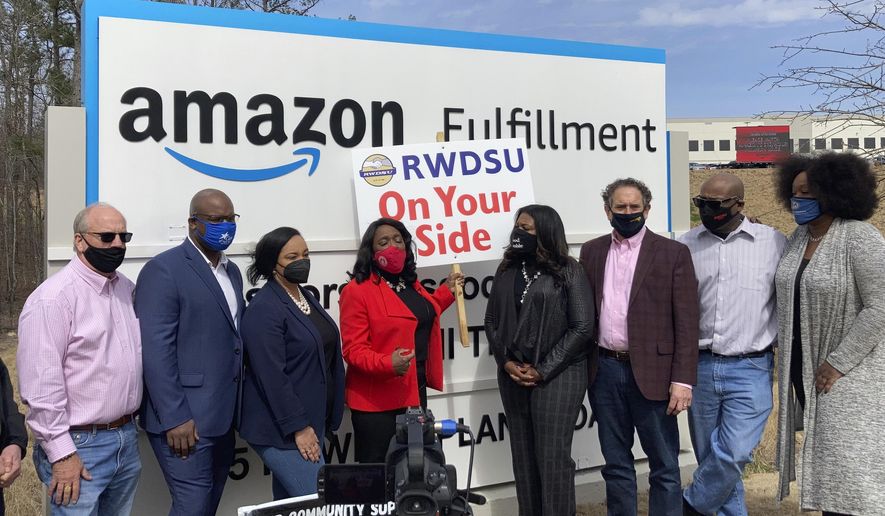OPINION:
Ronald Reagan used to say the nine most terrifying words in the English language are: I’m from the government and I’m here to help.”
These days those words might be applied to Amazon.
In 2019, Amazon was all set to “help” New York with the building of its second headquarters in Queens. But once taxpayers got a look at what it costs to land these projected 25,000 jobs — more than $2.8 billion in tax breaks — they decided to decline this gift.
Former President Trump also was on to its scam. Yes, Amazon delivered all kinds of products in record time and for less than its competitors, but it did so in large part because the U.S. Postal Service charged $2 to deliver its packages, even though the Postal Service’s costs were nearly $3.50.
So frustrated was Mr. Trump with the Postal Service’s refusal to renegotiate the Amazon deal or even create a plan to get the Postal Service out of this mess that he fired the postmaster general and had the new postmaster general fire most of the top brass.
Mr. Trump knew what Amazon was doing. It was taking advantage of the fact the Postal Service still considers its package delivery business to account for only 5.5% of its expenses when the actual total is about 25%. Thus, its losses in the package business look like gains, but its balance sheets, which are based in reality, look worse by the quarter even as package volume increases dramatically thanks to the pandemic.
Amazon locked in long-term deals with significant concessions on the part of the Postal Service and thus enjoyed discounts from the Postal Service that crippled its balance sheet but enabled Amazon to turn record profits.
Congress provided $10 billion in the CARES Act to the Postal Service, yet we can expect more requests for bailouts. Amazon, of course, is all over this approach — having taxpayers, in essence, pay for the damage it did to the Postal Service’s bottom line. It sponsors an Astroturf organization known as the Package Coalition, which is pushing for the bailouts.
John McHugh, the former Republican congressman from upstate New York and secretary of the Army, wrote recently on behalf of the coalition that the Postal Service’s “package services are critical to maintaining competition amongst carriers and choice for American businesses and consumers.”
In a sense, this is true. The Postal Service is, in effect, the end of the delivery grid for a lot of private package services. Given only the Postal Service can deliver to a mailbox, and only the Postal Service has the ways, means and system for hitting all 155 million addresses in the United States every day, it makes money delivering packages to the most remote addresses and to many that are not so remote on behalf of other carriers.
But then Mr. McHugh said the quiet part out loud. “By pairing them together,” he wrote, referring to package and first-class letter delivery, which only the Postal Service can do, “the competitive package services’ profitability supports the nationwide delivery network.”
That’s only true, of course, if the Package Coalition gets its way and the American taxpayers put up the money to make up the difference. The profits then will be individualized, but the losses will be billed to us.
They’re not advocating for this in the name of efficiency — higher package volumes cause longer mail delays, they do not relieve them. Last December, only 64% of first-class mail was delivered on time, but 95% of packages arrived on time. A month earlier, before demand peaked, 85% of mail was arriving on time.
The problem was not the postmaster general’s directives to streamline the Postal Service; it was the Package Coalition’s members, especially Amazon, cleaning up on bad deals with the Postal Service.
The talk about promoting competition is designed to intrigue conservatives, who understand economic energy comes from the marketplace, not government grants. Amazon also is trying to speak the language of conservatives in Bessemer, Alabama, where unions are attempting to organize a delivery depot. It seeks to rally lawmakers and others under the traditionally conservative anti-union banner to oppose the movement, but some conservatives are not having it.
“Amazon’s opposition to the union effort in its own backyard is also inconsistent with the progressive values it has forced on everyone else,” wrote Sen. Marco Rubio, Florida Republican, in an op-ed published in USA Today. “If Amazon thinks conservatives will automatically rally to do its bidding after proving itself to be such enthusiastic culture warriors, it is sorely mistaken.”
Lawmakers shouldn’t be doing Amazon’s bidding under any circumstances. There is enough suffering in this country to not spend another dime helping the world’s richest man get richer. But Amazon asking for conservatives for help after the way it has treated them is rich beyond belief.
• Brian McNicoll, a freelance writer based in Alexandria, Va., is a former senior writer for The Heritage Foundation and former director of communications for the House Committee on Oversight and Government Reform.




Please read our comment policy before commenting.